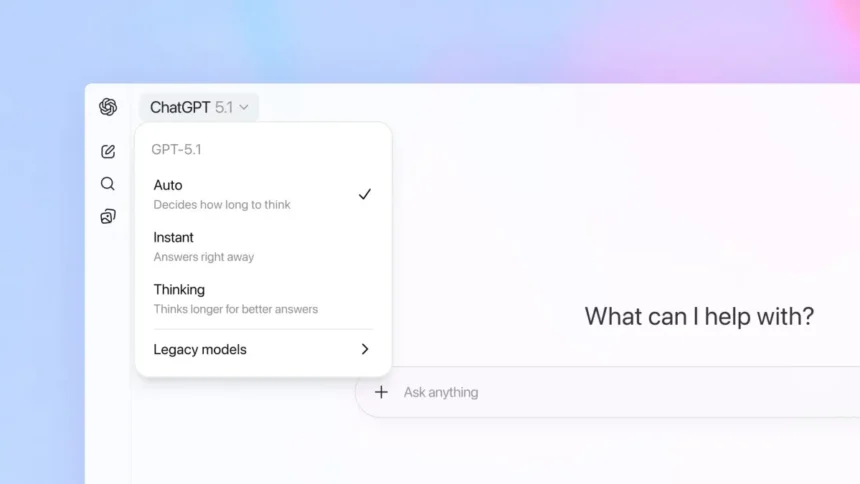5.1 is ‘playful, warm’ compared to the criticised GPT-5
The release of ChatGPT 5.1 landed with almost no ceremony. No livestream. No countdown. Just a quiet update from OpenAI. Yet, energy around the new model pops instantly. Users are testing it fast. And, early reactions offer a surprise: clearer tone, quicker replies, sharper reasoning, and a warmer voice.
OpenAI says this upgrade is a reset for GPT-5’s personality and behaviour. The company says the model speaks with more presence, more colour, and more precision. The deployment is small at first glance, but the ripple touches talent, trust, and the legal fight around data.
What’s Happening & Why This Matters
Model behaviour, tone shifts, and courtroom tension
ChatGPT 5.1 offers two modes: Instant and Thinking. Instant handles everyday prompts and keeps replies tight. Thinking processes heavier reasoning tasks. Both are available to Pro, Plus, Go, and Business users first. After that, access will be deployed to all users.
OpenAI’s leadership frames the update as a “nicer upgrade.” Sam Altman says the new model “feels more natural” with better instruction handling. His commentary lands with precision because earlier criticism claimed GPT-5 felt cold. GPT-4o briefly returned for paid users because people missed its warmth. Altman never liked GPT-4o’s personality, though. He called it “too enthusiastic,” almost theatrical. GPT-5.1 seeks a balance.

The new restored “warmth” also comes with structure. OpenAI offers six tone options: Default, Friendly, Efficient, Professional, Candid, or Quirky. Users can also tune custom tones. Early testers describe it as “playful,” “quick,” and “less mechanical.” The new vibe matters because tone evokes trust and comfort — two pillars for mass adoption.
Reasoning gets attention (and better), too. The company says GPT-5.1 chooses when to think step-by-step. It reads complex prompts and decides when deeper analysis is needed. Responses show more clarity without slowing down.
The legal fight enters the chat

The update drops during heavy legal action. The New York Times is pursuing a lawsuit against OpenAI over alleged copyright misuse. The Times is demanding access to 20 million ChatGPT logs. OpenAI rejects the demand and calls it a “privacy threat”.
OpenAI argues that the request reaches into private conversations. Jason Kwon, OpenAI’s chief security officer, advocates for a new form of “AI privilege” to protect private user data. The claim says people treat AI tools like personal diaries, sensitive workspaces, and intimate journals. Exposure places them at risk.

A court ruling from Magistrate Judge Ona Wang opposes OpenAI’s stance. Judge Wang says OpenAI fails to explain why privacy protections already in place are not enough. The ruling increases pressure on the company while it tries to rebuild trust, including through a more human-feeling model.
Ziff Davis, a leading media publisher, is also suing OpenAI on separate copyright claims. Its claims surround training data and rights ownership. As scrutiny of AI activities increases, GPT-5.1 arrived right in the middle of the crossfire.
TF Summary: What’s Next
ChatGPT 5.1 embodies OpenAI’s friendlier, more inviting direction. Users get more tone control, faster replies, and stronger reasoning. The timing matters because the legal environment is not a favourable one. AI behaviour, data access, and user trust are all under a microscope.
MY FORECAST: OpenAI enhances its products with improved voice control and increased personality. Public demand and feedback are driving the company to marry technical power with emotional intelligence. With legal fights ongoing, GPT-5.1 might help OpenAI demonstrate reasoning that humanity can get behind.
— Text-to-Speech (TTS) provided by gspeech


